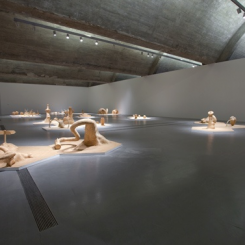SZ: You also have a blog called “Extraordinary Site,” which has maintained a steady rate of updates for many years; the diary seems to be a habit of yours, a method of documenting what happens in the here and now. Has this kind of diary also become a form of inscription, bearing with it your longstanding sigh for “the footprints of birds in the sand”?
QZJ: The “Extraordinary Site” blog was started in late 2005 and has run through the present. It has been viewed almost three million times and currently has 200 visits a day. It has become a medium, and its content is often reposted by other websites, so I cannot really take it as a diary for my own use. What I write there is usually block text, though I sometimes also use it as an educational platform.
Outside the blog, I still insist on writing a diary. When I was young I read the diary of Zeng Guofan and felt markedly inferior, knowing that man could live more seriously and more responsibly. Even if one simply records a few trivial things every day, this too is a time for self-contemplation. Though in these diaries outside of my blog, I do not record everything. To a certain degree, I see my diary as a letter to my future self.
This is not to say that all everyday incidents are worthy of inscription or engraving, but every single day is worth seriously reviewing. Besides the loneliness of “the footprints of birds in the sand,” we also have a concept of cyclical thinking: grief and joy are intermingled, after desperation comes hope, and after liberation there is responsibility. In the story of “The Old Man Who Moves Mountains,” the logic that “I shall leave a son behind, and through him a grandson” marks an instance of such cyclical or staged thinking, just as Liang Qichao said that “Success does not depend on me.” As I grow older I occasionally think that the masters of the past live on in my person. And of course, some tasks that currently lie with me will ultimately be passed down to the next generation to complete. The recording of a diary is related in some way to this awareness.



